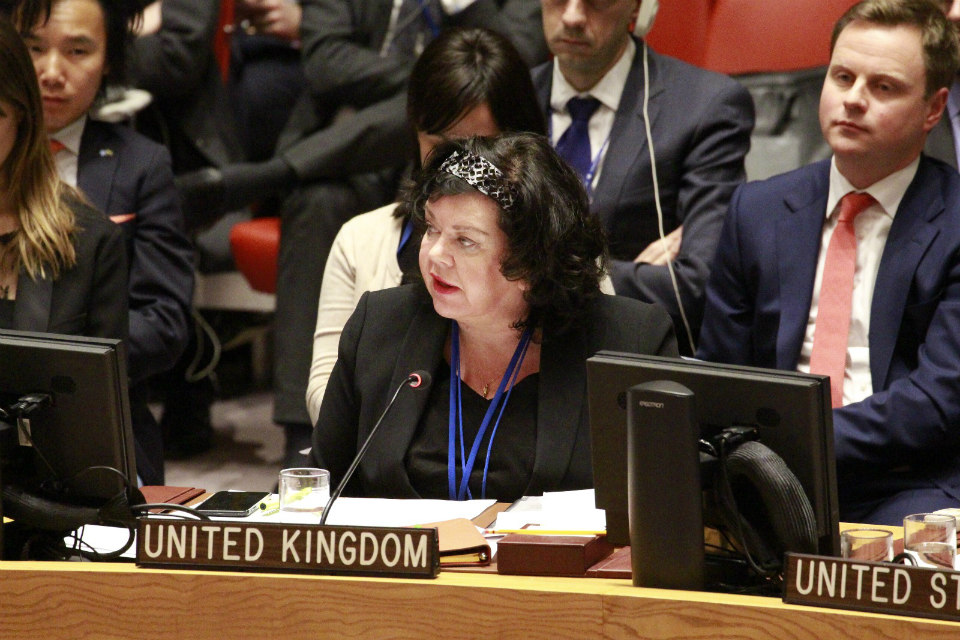Call for Humanitarian Assistance in Syria
Statement by Ambassador Karen Pierce, UK Permanent Representative to the UN, at the Security Council briefing on Syria.

Thank you Mr President. Thank you for being here today to underscore the vital importance of this topic, and thank you particularly for your very powerful statement. The United Kingdom supports your call for ICC referral.
Thank you also to the Under-Secretary-General for your continued efforts to keep the Council informed of the need for protection and registration. I support their calls. I will not rehearse the catalogue of suffering that we have heard so eloquently today but that omission should not be taken as any indication that the United Kingdom is not as horrified as others by what is happening on the ground.
Specifically Mr President, it’s diabolical that access is actually worse in the face of such suffering. Diabolical is a strong word, but there are no others to describe what is happening. The worst destruction and suffering has continued in Eastern Ghouta. Those who support Assad have not taken steps to help stop the violence. Instead of which Assad and his spotters have violated the strong words of this Council in Resolution 2401. This makes a mockery of the Council’s authority as Ambassador Delattre set out.
Since the 11 March, an estimated 100,000 people have left Eastern Ghouta and are in make-shift reception sites in rural Damascus. Thousands more have been bused to Idlib. Because there are no independent monitoring or provisions for civilians’ safety, those fleeing and those staying remain vulnerable, and at risk of mistreatment and abuse by the regime, including being detained, disappeared or separated from their families. Humanitarians, health workers and first responders on the ground report that the regime is deliberately targeting them. This is illegal and those that help the regime are complicit in that illegality.
The situation continues even for those who are left behind. An estimated 150,000 civilians remain in Eastern Ghouta. They suffer from acute food shortages and lack of medical supplies. They are afraid, and above all, they remember how the regime punished the civilians who fled from Eastern Aleppo in December 2016. This is why Ambassador Al-Otaibi’s call for protection and registration is so urgent. We welcome UN plans to scale up support to deal with the dire situations in the IDP camps and collective shelters. We call on Russia to use its influence with the regime to ensure that the UN and its partners can also provide assistance and protection for those who remain in Eastern Ghouta.
Whether civilians choose to stay or leave, it is essential that they be protected against attack and have access to the essentials to survive. This is not just a plea on the grounds of humanity; it is a requirement under international humanitarian law. It is the job of the Council and all members of the Council to uphold international humanitarian law. Those who side with regime in its actions are themselves guilty of violating that law.
Mr President, I would like in closing to highlight two further areas. The suffering of the Syrian people continues in Idlib, where civilians have been under attack by regime forces for many years. More than a million internally displaced Syrians live there, including those who have fled Eastern Ghouta. In Afrin, we recognise Turkey’s legitimate interest in the security of its borders, but at the same time we remain concerned about the impact of operations on the humanitarian situation. And my Prime Minister and Foreign Secretary have raised the need for both protection of civilians and access with President Erdoğan and his Ministers. It was good to hear from the Under-Secretary-General that there may at last be signs of progress in Afrin.
Mr President, after seven years of conflict, over 13 million people are in need of humanitarian assistance in Syria. The Assad regime has created the situation and is now is preventing humanitarian actors from relieving some of the horror it has inflicted. We call on Russia to use its influence to ensure that, at a minimum, the UN can fulfil its mandate to ensure humanitarian assistance and protection for Syrians on the basis of need, regardless of any other considerations.
Mr President, I was at Geneva in 2012. I think we all feel that that was a huge missed opportunity in the light of events. The situation has escalated every year since that time, and as the Undersecretary General said, the level of access is worse. The Council has a small opportunity to put measures in place to reduce the risk of reprisals. As you said Mr President, if this Council cannot do it, who can?
Thank you.